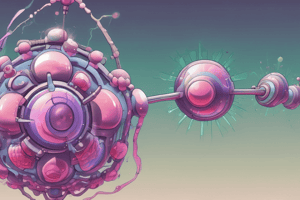Podcast
Questions and Answers
Which of the following best describes the mechanism by which impaired glucocorticoid receptor (GR) function contributes to hypercortisolism in some depressed patients?
Which of the following best describes the mechanism by which impaired glucocorticoid receptor (GR) function contributes to hypercortisolism in some depressed patients?
- Reduced glucocorticoid binding to GR prevents the negative feedback loop, causing continued release of CRH and ACTH. (correct)
- Enhanced sensitivity of the adrenal glands to ACTH results in an overproduction of cortisol.
- Increased GR expression leads to excessive cortisol production in response to normal ACTH levels.
- Decreased cortisol levels directly stimulate the hypothalamus to release more CRH.
A researcher is investigating the HPA axis activity in patients with atypical depression. Based on the information, what would they most likely observe?
A researcher is investigating the HPA axis activity in patients with atypical depression. Based on the information, what would they most likely observe?
- Reduced cortisol levels and an underactive HPA axis. (correct)
- Elevated cortisol levels and an overactive HPA axis.
- Normal cortisol levels and a normally functioning HPA axis.
- Increased cortisol levels, but only in response to specific environmental stressors.
A patient presents with symptoms of depression, including unreactive mood and elevated cortisol levels. Which subtype of depression is the patient MOST likely experiencing?
A patient presents with symptoms of depression, including unreactive mood and elevated cortisol levels. Which subtype of depression is the patient MOST likely experiencing?
- Situational depression.
- Melancholic depression. (correct)
- Seasonal affective disorder.
- Atypical depression.
In a depressed patient with glucocorticoid resistance, what is the expected impact on the levels of CRH, ACTH, and Cortisol?
In a depressed patient with glucocorticoid resistance, what is the expected impact on the levels of CRH, ACTH, and Cortisol?
Which of the following is a potential consequence of chronically elevated cortisol levels, as seen in some subtypes of depression?
Which of the following is a potential consequence of chronically elevated cortisol levels, as seen in some subtypes of depression?
Which physiological response is LEAST likely to occur during an acute stress response, such as public speaking?
Which physiological response is LEAST likely to occur during an acute stress response, such as public speaking?
In modern life, chronic stress differs from acute stress primarily because it:
In modern life, chronic stress differs from acute stress primarily because it:
Which of the following is a potential long-term consequence of chronic stress on physical health?
Which of the following is a potential long-term consequence of chronic stress on physical health?
How does the body prepare for a 'fight or flight' response when faced with an acute stressor?
How does the body prepare for a 'fight or flight' response when faced with an acute stressor?
What is the relationship between stress and depression, as suggested in the lecture?
What is the relationship between stress and depression, as suggested in the lecture?
Which of the following best describes the difference between the stressors faced in modern life versus those faced in ancestral times?
Which of the following best describes the difference between the stressors faced in modern life versus those faced in ancestral times?
According to the lecture, what might happen if cortisol levels are measured in the saliva of someone giving a public speech?
According to the lecture, what might happen if cortisol levels are measured in the saliva of someone giving a public speech?
Which of the following is NOT typically associated with chronic stress?
Which of the following is NOT typically associated with chronic stress?
In the twin study, how did neuroticism levels appear to modify the impact of adversity on major depression?
In the twin study, how did neuroticism levels appear to modify the impact of adversity on major depression?
What effects do chronically high levels of glucocorticoids, induced by stress or direct administration, have on animals?
What effects do chronically high levels of glucocorticoids, induced by stress or direct administration, have on animals?
How might the administration of high-dose synthetic glucocorticoids influence mood symptoms over time?
How might the administration of high-dose synthetic glucocorticoids influence mood symptoms over time?
What is the role of ACTH in the HPA axis?
What is the role of ACTH in the HPA axis?
What is the primary mechanism by which the HPA axis is regulated under normal conditions?
What is the primary mechanism by which the HPA axis is regulated under normal conditions?
What is the function of corticotropin releasing hormone (CRH) and arginine vasopressin in the stress response?
What is the function of corticotropin releasing hormone (CRH) and arginine vasopressin in the stress response?
Why might patients with Cushing's syndrome exhibit high rates of depression?
Why might patients with Cushing's syndrome exhibit high rates of depression?
How does the proportional hazard model used in the twin study help to predict major depressive episodes?
How does the proportional hazard model used in the twin study help to predict major depressive episodes?
Flashcards
Acute Stress Response
Acute Stress Response
An immediate, adaptive response to an acute threat, like being chased.
Energy Mobilization (Stress)
Energy Mobilization (Stress)
Mobilization of glucose and energy to fuel muscles for fight or flight during stress.
Physiological Stress Responses
Physiological Stress Responses
Increased blood flow, faster breathing, increased blood pressure, and slowed digestion during stress.
Cortisol Increase
Cortisol Increase
Signup and view all the flashcards
Chronic Stress
Chronic Stress
Signup and view all the flashcards
Effects of Chronic Stress
Effects of Chronic Stress
Signup and view all the flashcards
Health Risks of Chronic Stress
Health Risks of Chronic Stress
Signup and view all the flashcards
Stress and Depression Link
Stress and Depression Link
Signup and view all the flashcards
Neuroticism
Neuroticism
Signup and view all the flashcards
Adversity
Adversity
Signup and view all the flashcards
Glucocorticoids
Glucocorticoids
Signup and view all the flashcards
Neurogenesis
Neurogenesis
Signup and view all the flashcards
Monoamines
Monoamines
Signup and view all the flashcards
Synaptic Plasticity
Synaptic Plasticity
Signup and view all the flashcards
Hippocampus
Hippocampus
Signup and view all the flashcards
Adrenal Glands
Adrenal Glands
Signup and view all the flashcards
Glucocorticoid Resistance
Glucocorticoid Resistance
Signup and view all the flashcards
Hypercortisolism in Depression
Hypercortisolism in Depression
Signup and view all the flashcards
Atypical Depression
Atypical Depression
Signup and view all the flashcards
Melancholic Depression
Melancholic Depression
Signup and view all the flashcards
Cortisol's Role in Inflammation (Depression)
Cortisol's Role in Inflammation (Depression)
Signup and view all the flashcards
Study Notes
- Acute stress is adaptive, mobilizing glucose for fight or flight
- Public speaking increases blood flow to the brain, increases alertness and breathing, slows digestion, and increases perspiration
- Cortisol levels increase, resulting in increased energy mobilization and muscle tension in stressful situations
Chronic Stress
- Modern stressors are often chronic and imagined
- The stress response can become more damaging than the stressor itself
- Outcomes include digestive problems, increased stomach acids, cholesterol, fatty acids, blood pressure, and blood sugar
- Can contribute to hypertension and diabetes, menstrual cycle irregularities, reduced sperm count, reduced testosterone, increased infection risk, and depression
Stress and Depression
- Stress and depression are highly correlated
- The effects of stress depend on individual vulnerability factors
Neuroticism Study
- Study featuring over 7,500 twins from a population assessed neuroticism and adversity
- Those with low neuroticism are less sensitive to the depressogenic effects of adversity than those with high neuroticism
Animal Studies
- Chronically high glucocorticoid levels, induced by stress or direct administration, cause depression-like behavior
- This includes decreased neurogenesis, monoamine dysfunction, impaired synaptic plasticity, and reduced hippocampal volume
Clinical Relevance
- Patients receiving high dose glucocorticoids initially develop manic symptoms, but after weeks of treatment, they are more likely to demonstrate depressive symptoms
Synthetic Glucocorticoids
- Powerful anti-inflammatory agents that treat conditions like asthma and autoimmune diseases
Cushing's syndrome
- Disorder caused by overproduction of cortisol that can happen for various reasons including tumours
- The rates of depression are high
HPA Axis Regulation
- The hypothalamus secretes corticotropin releasing hormone and arginine vasopressin, which stimulates adrenal cortical hormone secretion from the pituitary
- ACTH travels to the adrenal glands to promote cortisol synthesis and release
- High stress increases cortisol levels
Cortisol Production Mechanisms
- Under normal conditions, cortisol provides negative feedback to the hypothalamus and pituitary to stop its production
- When feedback inhibition fails = glucocorticoid resistance likely related ot impaired glucocorticoid receptor (GR) function
- Depression may result from reduced glucocorticoid binding to GR or reduced GR expression
- Increased cortisol cannot signal the brain to stop CRH and ACTH release, so cortisol production continues
Depression and Cortisol Levels
- Severe cases feature increased cortisol levels, termed hypercortisolism and HPA-axis hyperactivity
- Classic or melancholic depression is characterized by unreactive mood
- Atypical depression, includes reactive mood with increased appetite is where HPA-axis hypoactivity and hypocortisolism have been reported
Inflammatory Contradiction
- Cortisol, the most potent anti-inflammatory hormone is increased alongside inflammation
- Evidences showing elevation in both cerebrospinal fluid and the periphery
Studying That Suits You
Use AI to generate personalized quizzes and flashcards to suit your learning preferences.
Description
This content explains the mechanism by which impaired glucocorticoid receptor (GR) function contributes to hypercortisolism in some depressed patients. It covers the role of GR in regulating the hypothalamic-pituitary-adrenal (HPA) axis. It also details how reduced GR sensitivity can lead to a failure in negative feedback, resulting in elevated cortisol levels.


